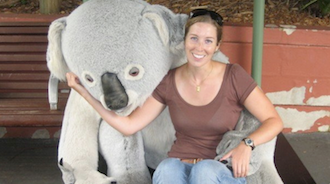
What position do you hold at SFS?
I am currently the Admissions Manager at SFS. I’ve been with SFS for a little over five years. I come from a background in Ecology from my undergraduate and graduate studies. I started off with SFS as an intern at our Australia program. As an intern I served as sort of a teaching assistant for the professors and also with logistics like driving students to different field sites and getting gear packed for field trips. I also served as the Student Affairs Manager for the Australia program for the Spring 2007 and Summer 2010 programs and was responsible for risk management, student health and safety, and program logistics. I started working in the Admissions department of SFS in March 2009, while I was finishing up my Masters in biology (I studied at Louisiana State University in Baton Rouge, Louisiana).
Which study abroad destination is most underrated? Conversely, which is most overrated?
I’m going to try to be very diplomatic here, by not naming any countries in particular. While there are certain countries that are very popular for studying abroad, and others which are not, I believe it is not a matter of being under or overrated, but rather what is right for the student. Students should pick a country and location where their educational goals can be best met. In order to make that choice, students need to have a clear idea of their goals by speaking with their professors, advisors, family, and peers.
It is important for students to have access to study abroad advisors on their home campus to help assist them through the process so that they do not end up going to the wrong place for the wrong reasons. For example, SFS offers programs in “non-traditional”, perhaps underrated locations, but for students interested in ecology, natural resource management, environmental policy, and socioeconomics, these programs are the ideal setting. However, students need to be able to think outside of the more traditional study abroad destinations in order to make a semester with SFS a reality. For example: a biology student could go to London and study biology in a university setting, live in the city, and have a flat, or that same biology student could study biodiversity and conservation through hands-on field lectures and field research in the Peruvian Amazon. For some students, the former is the best choice, but for others it’s the latter!
What is one piece of advice you would offer someone considering studying abroad with SFS?
Take full advantage this opportunity! Go abroad! If you study with SFS, make the most of every day. You may never again have an experience or opportunity like this. Wake up early to see the sunrise, stay up late to look at the stars. Dive into your Directed Research project. Make friends with the locals, get to know your professors. Approach each day with lots of energy and an open mind so that you can make the most of it.
What makes SFS programs stand apart from other program options?
SFS programs are a totally different ballgame. Instead of moving their life on campus over to a university abroad, going to classes, living in a dorm, and all the rest, SFS students get an entirely different experience. SFS students live in small communities in the environment that they’re studying. The knowledge they gain in the classroom isn’t an abstraction. For example, students may learn about changing land use and then immediately go out and see how rain forests in Peru have been transformed into pastures, farm lands, or gold mining sites. They may learn about the carrying capacity for large carnivores in forest fragments and then use camera trap data to compare the population size of jaguars in forest patches of varying sizes in the Peruvian Amazon. This sort of hands-on, real time learning and the ability to participate in real research is a great opportunity that SFS provides and which sets it apart from more traditional study abroad experiences.